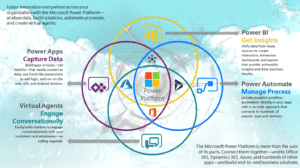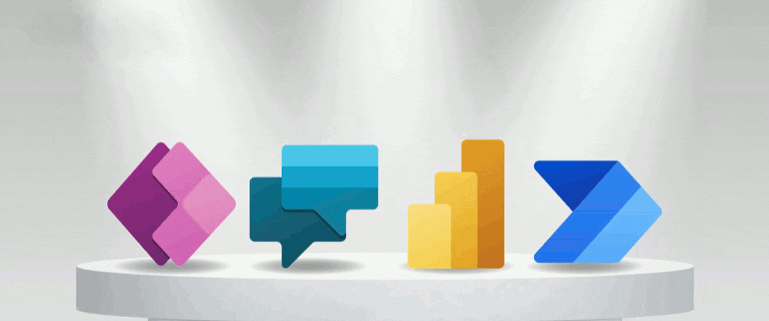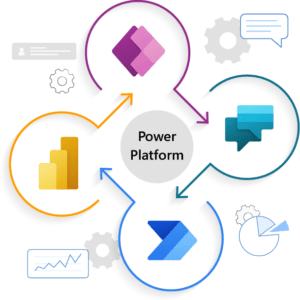What Is Microsoft Power Platform ?
Microsoft Power Platform is a transformative suite of tools designed to empower businesses to automate, innovate, and get insights from their data without the need for extensive coding. In this article, we’ll delve into what the Power Platform is, its components, its uses, and why businesses should consider leveraging its capabilities.
What is Microsoft Power Platform?
Microsoft Power Platform is a collection of low-code tools that allow business users to create custom applications, automate workflows, analyze data, and build chatbots without the need for extensive programming. The platform comprises four main components:
- Power Apps: A tool for building custom applications tailored to business needs.
- Power Automate: A solution for automating repetitive tasks and workflows.
- Power BI: A data visualization and analysis tool.
- Power Virtual Agents: A platform for creating chatbots to interact with users.

#Microsoft Power Platform
Uses of Microsoft Power Platform
The versatility of the Power Platform means it can be employed in a myriad of ways across different industries. Some of its primary uses include:
- Automating Manual Tasks: With Power Automate, businesses can automate routine tasks like sending email notifications, document approvals, and data updates.
- Building Custom Applications: Power Apps provides the tools to create applications for tasks such as customer relationship management, inventory tracking, and order processing.
- Data Analysis: Power BI can pull data from various sources, allowing businesses to gain insights and make informed decisions.
- Creating Virtual Agents: Power Virtual Agents lets businesses build chatbots that can provide round-the-clock customer support.

#Uses Of Microsoft Power Platform
The Power Platform offers several benefits to businesses, including:
- Empowering Business Users: It allows users without technical expertise to build applications, automate tasks, and analyze data.
- Boosting Efficiency: By automating tasks and streamlining processes, businesses can achieve higher productivity levels.
- Cost Reduction: Automation and reduced reliance on custom software development can lead to significant cost savings.
- Enhancing Customer Service: Chatbots can provide instant responses to customer queries, improving service levels.
Real-world Applications of Microsoft Power Platform
Many businesses across various sectors are already harnessing the power of the Power Platform. For instance:
- A retailer might use Power Automate to send out order confirmations and shipping notifications automatically.
- A manufacturer could employ Power Apps to let sales reps monitor customer orders and inventory levels in real-time.
- Healthcare providers might use Power BI to analyze patient data and discern health trends.
- Financial institutions could deploy Power Virtual Agents to answer customer queries about their accounts.
Conclusion
In today’s fast-paced business environment, the ability to quickly adapt and innovate is crucial. Microsoft Power Platform provides the tools businesses need to stay ahead of the curve, improve operations, and achieve their objectives. Whether you’re looking to automate tasks, gain insights from your data, or enhance customer interactions, the Power Platform has something to offer.


